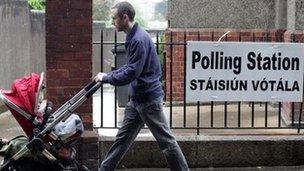Ireland votes in favour of fiscal treaty
- Published
- comments

Some 3.1 million people were registered to vote in the referendum
So after a nervous night, Enda Kenny will be relieved by the 60% margin of victory in the Irish referendum on the fiscal pact.
The Taoiseach's measured welcome for the result reflects his knowledge that this is not the end of Ireland's austerity, nor even the beginning of the end, although like Winston Churchill, Mr Kenny might hope this is at least the end of the beginning.
Having delivered the German Chancellor Angela Merkel a rare bit of good news, Dublin will hope Europe's leaders might reward their decision to stay within the fiscal stability pact with a reciprocal degree of flexibility.
The talk of the European Central Bank stepping in to bail out banks directly is attractive to national governments who have previously had to load such rescue packages onto their own balance sheets.
But with dark clouds still looming over Greece and Spain, it is impossible at this stage to gauge whether the Irish referendum will have much impact in slowing the speed of the European financial tail spin.
Sinn Fein may find themselves on the losing side.
However there is plenty of reason for Gerry Adams et al to take heart.
The widespread support for the No campaign in working class areas will be something Sinn Fein will no doubt harness as they seek to supplant Labour as the voice of those at the sharp end of the austerity cuts.
With Fianna Fail hidebound by its past involvement in seeking the 85bn euros EU IMF bail out, and Labour hampered by its status as junior coalition partner, the political waves parted for Sinn Fein.
Although Gerry Adams publicly expresses concern about what this Yes vote might lead to, a respectable defeat means republicans do not have to deal with the consequences of what could have been a risky and expensive No vote.